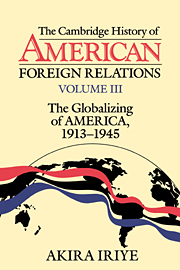Book contents
- Frontmatter
- 1 The age of European domination
- 2 The Great War and American neutrality
- 3 The United States at war
- 4 The Versailles peace
- 5 The 1920s: the security aspect
- 6 The 1920s: the economic aspect
- 7 The 1920s: the cultural aspect
- 8 The collapse of international order
- 9 Totalitarianism and the survival of democracy
- 10 The emergence of geopolitics
- 11 The road to Pearl Harbor
- 12 The global conflict
- Bibliographic Essay
- Index
- THE CAMBRIDGE HISTORY OF AMERICAN FOREIGN RELATIONS
- References
10 - The emergence of geopolitics
Published online by Cambridge University Press: 28 March 2008
- Frontmatter
- 1 The age of European domination
- 2 The Great War and American neutrality
- 3 The United States at war
- 4 The Versailles peace
- 5 The 1920s: the security aspect
- 6 The 1920s: the economic aspect
- 7 The 1920s: the cultural aspect
- 8 The collapse of international order
- 9 Totalitarianism and the survival of democracy
- 10 The emergence of geopolitics
- 11 The road to Pearl Harbor
- 12 The global conflict
- Bibliographic Essay
- Index
- THE CAMBRIDGE HISTORY OF AMERICAN FOREIGN RELATIONS
- References
Summary
Wars in Asia and Europe
Until 1936, totalitarianism in Asia and Europe had not been directly connected. Japanese militarism had developed its own agenda on the Asian continent, while Italian fascism and German Nazism had pursued their respective strategies, the former seeking to conquer Ethiopia and the latter focusing on asserting the right to rearm and to repudiate the Versailles restrictions. The three offered piecemeal challenges to the world order, but their interests and orientations were sufficiently divergent that their separate actions had not added up to a combined threat to global peace and security.
The picture began to change in 1936. In July a civil war broke out in Spain, the Fascists led by General Francisco Franco challenging the authority of the republican government in Madrid. Almost immediately, Germany and Italy began assisting the insurgents, while the Soviet Union took sides with the Republic. Britain and France desperately sought to prevent the civil war from turning into an international war and succeeded, at least on paper, in establishing an international committee of nonintervention. But the civil war continued, and during 1937–9 Franco’s forces steadily gained ground with the help of German arms, particularly aircraft as well as aviators.
In November 1936 Germany, Italy, and Japan signed an anti-Comintern pact. Ostensibly an agreement to cooperate in order to combat Comintern-led subversive activities in the wake of the newly promulgated popular-front strategy, the pact contained a secret clause in which the signatories pledged to come to each other’s aid should one of them become involved in a war against the Soviet Union.
- Type
- Chapter
- Information
- The Cambridge History of American Foreign Relations , pp. 149 - 169Publisher: Cambridge University PressPrint publication year: 1993



